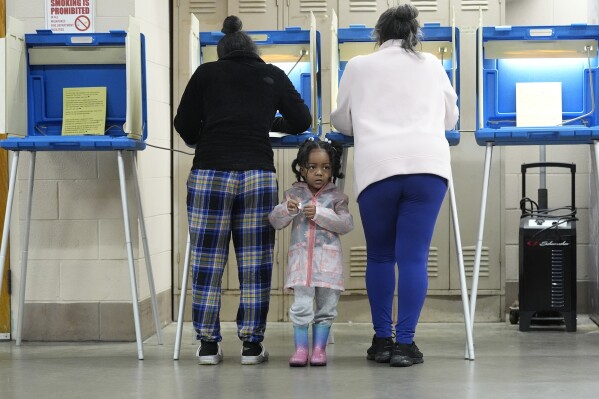ATLANTA (AP) — Georgia has been rocked by furious battles over election laws ever since Democrat Stacey Abrams’ narrow loss to Republican Brian Kemp in the 2018 governor’s race.
The statewide brawl burst into the national consciousness in 2021, when Republicans — under pressure from GOP activists who pushed Donald Trump’s false claims that he lost the 2020 election because of widespread fraud — rammed through a sprawling law placing new restrictions on voters.
Now, with only months to go before a likely rematch between Trump and President Joe Biden, Georgia is tinkering with state election laws once again. Just last week, Republican lawmakers passed a new bill that would allow the removal of people from the voting rolls through challenges to voter eligibility. It awaits Kemp’s signature or veto.
Supporters say such challenges prevent fraud by rooting out duplicate records and removing voters who have moved out of state. Opponents allege they misuse data and will put legitimate voters through a legal wringer.
Here’s a closer look at the issue:
WHAT’S A VOTER CHALLENGE?
Georgia, along with other states, allows citizens to file challenges to an individual’s eligibility to vote, such as when they have personal knowledge of a neighbor moving out of state. Now, however, residents are increasingly challenging large numbers of voters through the use of impersonal data, including the National Change of Address list maintained by the U.S. Postal Service. Others comb through the rolls looking for people not registered at residential addresses. A Texas group called True the Vote challenged 364,000 Georgia voters prior to two U.S. Senate runoffs in 2021. Since then, individuals and groups have challenged about 100,000 more.
WHAT MOTIVATES CHALLENGERS?
Under federal law, Georgia can only remove someone from the rolls if they don’t respond to a mailing at their registered address and then don’t vote in two subsequent federal general elections. That process can take five years. Republican activists who support challenging large numbers of voters say that’s too long.
“These are voters who moved some months or years before voting at their old address, went back and showed a driver’s license they knew they had not updated, claimed to still live there, and they were handed the ability to vote,” said Mark Davis, a Gwinnett County resident who said he’s been combing voter rolls for decades. He testified for Republicans at a Feb. 15 state Senate hearing that helped shape this year’s legislation.
WHY DO SOME OPPOSE CHALLENGES?
Opponents describe the mass-voter challengers as “vigilantes” who are upsetting the balance between updating voter rolls and ensuring everyone has the right to vote.
“There are folks here who want to pretend we have a massive problem with our rolls and that if there is a name of a dead person on the rolls, that’s a real security risk,” Rep. Saira Draper, an Atlanta Democrat who opposed the bill, said last week. “But set aside the fearmongering and the logical leaps, and the facts reveal that actual voter fraud in Georgia is infinitesimally small.”
Fair Fight Action, a group founded by Abrams that unsuccessfully sued over the True the Vote challenges, argues such challenges disproportionately target younger and poorer voters, including African Americans, because they move more often. Interim Fair Fight CEO Lauren Groh-Wargo said she believes Republicans are trying to win Georgia elections by pushing out Democratic-leaning voters.
Opponents also note that the challengers happen to include party activists and Trump allies who backed Trump’s false claims. One of them is Brad Carver, head of the Georgia Republican Party’s Election Confidence Task Force and one of 16 Republicans who falsely claimed to be legitimate electors for Trump in Georgia. Also involved is Cleta Mitchell, a former Trump lawyer who took part in the January 2021 phone call during which Trump urged Georgia Secretary of State Brad Raffensperger to “find” enough votes to overturn Biden’s Georgia victory.
“I cannot believe that we are still bending over to accommodate election deniers, conspiracy theorists and unindicted co-conspirators when it comes to election policy,” Draper said.
WHAT WOULD THE NEW BILL DO?
The bill defines probable causes for removing voters from the rolls, among them death, evidence of voting or registering in another jurisdiction, a tax exemption indicating a primary residence elsewhere, or a nonresidential address. Most controversially, the new bill says that the National Change of Address list can be considered, though not exclusively. Opponents say the list is unreliable.
It’s not clear how the law will change things, though, as the state has never issued guidelines to counties on how to handle challenges. That means some may accept them based on the probable causes outlined in the bill, while others could reject mass challenges outright.
WHAT DO OPPONENTS SEE AS THE PROBLEMS?
Opponents of the new bill say it could hurt legitimate voters. For example, people sometimes live at a place of business, which would be considered a nonresidential address. Officials with Raffensperger’s office say there are more reliable types of information, such as driver’s license data, to confirm a voter’s eligibility.
Gabriel Sterling, Raffensperger’s chief operating officer, testified in February that removing voters from the rolls too aggressively could lead to lawsuits under the National Voter Registration Act.
“When you do loose data matching, you get a lot of false positives,” Sterling said. “When you get a lot of false positives ... that’s when you get sued, and that’s when you have a lot of problems doing list maintenance.”
The bill also says homeless people must use the county voter registration office as their address instead of where they live. Opponents say that could make it harder for homeless citizens to cast ballots because their registered polling place might be far away.
COULD CHALLENGED VOTERS BE SCARED AWAY?
Opponents say receiving a voter challenge letter in the mail is a scary experience, and voters may have to make time to appear at a county meeting to defend their eligibility.
A federal judge ruled in January, however, that challenges don’t amount to illegal intimidation under the Voting Rights Act.
ARE THERE GROUNDS FOR A LAWSUIT?
The American Civil Liberties Union of Georgia has already threatened to sue if Kemp signs the bill into law.
The National Voter Registration Act says states and counties can’t make systematic changes to voting rolls within 90 days of a federal election. The Georgia bill would allow challenges to be accepted and voters removed from the rolls up until 45 days before an election.
Jeff Amy covers Georgia politics and government.Disclaimer: The copyright of this article belongs to the original author. Reposting this article is solely for the purpose of information dissemination and does not constitute any investment advice. If there is any infringement, please contact us immediately. We will make corrections or deletions as necessary. Thank you.



